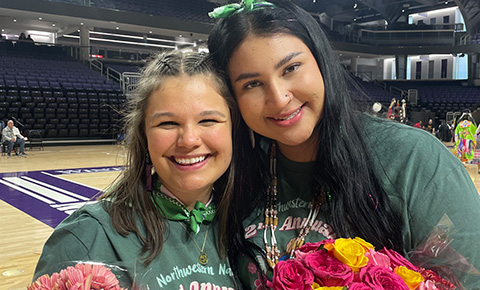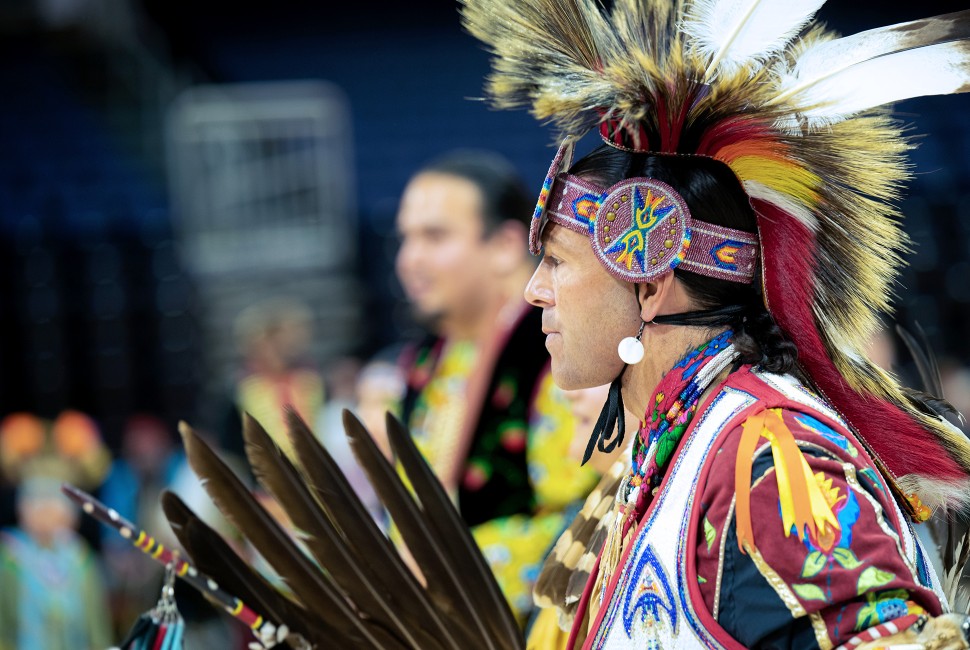Behind the Scenes of Northwestern’s Third Annual Pow Wow
It was something we could always come back to, to reground and refocus ourselves.”
Mel McDaniel
School of Communications Junior
Student Leaders in NU’s Native and Indigenous Community Share the Story Behind Community Gathering
For juniors Mel McDaniel (Comms ‘23) and Alivia Britton (SESP ‘23), the annual Northwestern Pow Wow has helped define their college experience.
They have been planning, learning, and promoting the event since September, with their work finally culminating in a vibrant celebration at the end of April in Welsh-Ryan Arena. The Third Annual Pow Wow hosted local Indigenous drum, dance, and singing groups, as well as vendors and guest appearances from other Northwestern student organizations.
The product of McDaniel and Britton’s long year of work was an event that was energetic and bustling yet deliberate and well-structured, with a tangible focus on local Native communities and this year’s theme: “Honoring the Water.”
This is now the second year the pair has co-chaired the Pow Wow Planning Committee, and the skills they gained from that first go-around have been invaluable in putting together the 2023 iteration.
“From little details like sending emails to talking with the head staff, you just realize all of the layers and complexities,” said Britton.
 The 2023 Pow Wow had approximately 2000 attendees, and this year boasted well over that number.
The 2023 Pow Wow had approximately 2000 attendees, and this year boasted well over that number.
“Last year was a learning curve, just because there’s so much that goes into it that you don’t even think about,” said McDaniel.
A lot of that learning was centered around understanding community relationships and history, building trust and respect with local indigenous leaders and groups and fostering a space of shared celebration and tradition.
Britton has roots in the Ottawa and Potawatomi tribes, two groups native to the Great Lakes region and thus already well-represented at the Pow Wow. But McDaniel hails from Northern California and is Tyme Maidu, a smaller tribe with its own practices and culture.
“The homelands that [Northwestern] occupies are reflected in the groups we chose,” said Britton.
The role of host drum was one important decision affected both by their individual Native heritages and the cultures of nearby tribes.
“Being host drum is a really big responsibility and undertaking and demonstrates a lot of respect,” explained Britton.
But ultimately, they said it was an easy choice.
“We picked a local Chicago group called Oka Homma,” said McDaniel. “We already had mentors in that group, so it made a lot of sense to bring them in for this.”
Similarly, the Committee also invited the Little Soldier Singers, a multigenerational group hailing from the Prairie Band Potawatomi Nation—the first federally recognized tribe in Illinois.
After the experience of their first year as co-chairs, McDaniel and Britton brought new goals to NAISA’s (Northwestern Native American and Indigenous Student Alliance) “Dreaming Meeting,” which convened at the beginning of the fall to set goals and intentions for the year to come.
“It was something we could always come back to, to reground and refocus ourselves,” said McDaniel.
One of the positive outcomes of the Dreaming Meeting was a shift from a pre-Pow Wow press conference to an interview and press-free celebration. This allowed the organizers to enjoy the event they had worked so hard on, spend time with their families and ultimately feel a true connection to the day’s theme and community.
Though it was already evident from all they had described, McDaniel said, “There are so many aspects that have so much thought put into them.”
For another example, she noted that the Pow Wow attendees and performers were dancing on a floor built from Menominee lumber.
Britton said that even as a sophomore, she felt so honored and appreciative of the trust that the tribal leaders and communities they worked with placed in NAISA and the Planning Committee. That feeling of happy surprise returned again in 2024.
“We got a lot of questions and participation from members of the Evanston community,” said Britton. “People were very respectful with asking who can participate in what, and our emcee [Shannon Martin] did an amazing job explaining the significance of everything that was happening.”

NAISA was also able to use the event as an opportunity to platform other Northwestern student groups, specifically Mariachi Northwestern and Ballet Folklórico Northwestern.
“We were so happy to be able to uplift other communities and show solidarity with these groups,” said McDaniel.
Despite all of this variety, forethought, and support, the Pow Wow is still a very young tradition. The annual event only began in 2022, Britton and McDaniel’s freshman year. The three years prior had seen former NAISA leaders advocating for this new addition to Northwestern’s calendar.
The co-chairs shared that the 2024 Pow Wow was a $38,000 event, including things like flights and lodging for groups and performers visiting from long distances—and NAISA does all of the fundraising themselves.
“Like other student orgs, most of our budget comes from ASG [Associated Student Government],” said Britton. “But we also reach out to a lot of other university departments for support, including the President’s Office.”
Britton and McDaniel were again taken aback by the compounding success of the annual Pow Wows, as people and organizations began writing to the Planning Committee with donation offers before they even approached them with the request.
“What we found is that everyone wants to support this,” Britton said. “We’re really proud to have no corporate sponsors.”
“We hope that someday soon this will become an institutionalized event like NUDM [Northwestern University Dance Marathon], another item fundraised by the university,” McDaniel added.
Britton also works at the university’s Office of Institutional Diversity and Inclusion, which she is currently petitioning to make the Pow Wow a “protected” event within the university’s budget.
After three years of college spent on the Pow Wow Planning Committee—and two years as its leaders—Britton and McDaniel have complicated feelings about what their relationship with the event may look like next year, as seniors.
“I really struggled to step back and be proud [after this year’s Pow Wow],” said McDaniel.
“I’m still in a very reflective place,” agreed Britton. “But I’m really happy with how it went.”
Beyond the scope of the Pow Wow itself, this new tradition demonstrates that students have a passionate enthusiasm for, and commitment to, the growth and expansion of the college Native American and Indigenous experience.
“To be honest, I never thought I would find such a strong Native community at a PWI [predominately White institution],” McDaniel reflected. “I especially didn’t think I would leave [Northwestern] with an even stronger Native identity.”
